Once a woman’s right to choose was a personal medical decision. Instead, over history, that right has been subject to power: political and religious, inextricable from inequalities of gender, race and class. Since the fall of Roe in 2022, abortion is illegal in over a quarter of the country and restricted in over half. It is so polarized along partisan lines that it is hard to imagine that it ever wasn’t and yet over time the debate has changed fundamentally.
Article continues after advertisement
The following books seek to elucidate reproductive rights from disparate angles: historical, legal, rhetorical, societal, moral. What’s exceedingly clear is that women’s health is at risk. These books show how the infringement of reproductive rights endangers women. Women have died from illegal abortion, and discriminating medical care, been coerced into surrendering babies born out of wedlock, and undergone forced sterilization. And so, the fight for reproductive rights and justice continues. But perhaps the collective knowledge in these diverse books indicates some direction for a way forward.
*
Leslie J. Reagan, When Abortion Was a Crime: Women, Medicine, and Law in the United States, 1867-1973, 1996
When Abortion Was a Crime was published in 1996 as the first history of the century-long period during which abortion was a crime. The book was reissued in February of 2022, before, but not unaware of the possibility of, the overturn of Roe v. Wade, with a new preface. In it, Reagan addresses that prospect; “If the Supreme Court overturns Roe, the country will be divided, with abortion legal in nearly half of the states and illegal in the other half.”
Already, thirteen states have fully banned abortion. Twenty-eight have bans according to gestational limits. When Abortion Was a Crime is “an unsettling illumination of what happens when abortion rights are nonexistent… a reflection on where we came from, a warning of what might lie ahead and a chilling reminder that history repeats itself” (Electric Literature). “We have concrete evidence of the consequences of making abortion a crime. That is the story this book tells” (Preface to the 2022 Edition). “Abortion, however, is an American tradition,” Reagan writes. “There would be no history of illegal abortion to tell without the continuing demand for abortion from women, regardless of law.” Leslie J. Reagan is a Professor History, Law, Gender and Women’s Studies, and Media Studies at the University of Illinois at Urbana-Champaign.
1998 James Willard Hurst Book Award Winner (Law and Society Association) • 1995 President’s Book Award Winner (Social Science History Association) • 1997 Choice Outstanding Academic Book of the Year
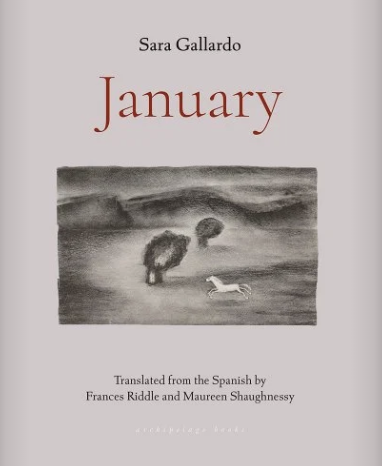
Sara Gallardo, January, 1958
Translated into English for the first time in 2023, January, originally published in 1958, is a “short and hair-raisingly good” novel from Argentine writer, Sara Gallardo, “a writer of terrifying intelligence” (New York Review of Books, The New Yorker). “January was the first Argentine novel to represent rape from the survivor’s perspective and to explore the life-threatening risks pregnancy posed in a society where abortion was both outlawed and taboo” (Archipelago Books). “Argentinian feminists, who in 2020 won the right to legal abortion nationwide during the first fourteen weeks of pregnancy, …still reference January as a turning point in the nation’s consciousness” (The New Yorker). “A crystalline and tightly-wound story…Elegant and forceful–I couldn’t put it down” (Catherine Lacey, author of Biography of X).
One of The New Yorker’s Best Books of 2023
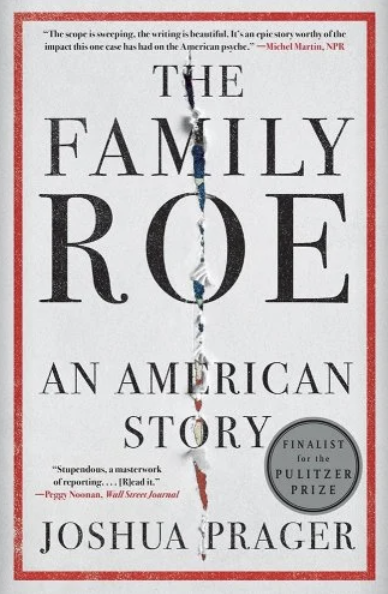
Joshua Prager, The Family Roe: An American Story, 2021
Ask anyone the first Supreme Court decision that comes to mind, their answer, likely, “Roe v. Wade.” But would they know anything about “Jane Roe,” the plaintiff, a woman named Norma McCorvey, who is inextricable from abortion discourse, though she never had one? The Family Roe tells her story, it is a biography of her life and the life of Roe v. Wade—the story of abortion through people instead of politics (The New York Times). Joshua Prager, journalist and author, “is not unsympathetic to McCorvey, but he sees her clearly”—she is “both heroine and villain—and a paragon of human complexity (The New Yorker, The NYT). Her story is not what you might expect, and Prager, who spent hundreds of hours with Norma before she died in 2017, gets at a fundamental truth. Bodily autonomy is a human right, it should not depend upon the human to earn it.
Finalist for the 2022 Pulitzer Prize for General Nonfiction • Finalist for the J. Anthony Lukas Book Prize • Finalist for the National Book Critics Circle Award for Nonfiction • One of NPR’s Best Books of 2021 • A New York Times Notable Book of 2021 • One of TIME’s 100 Must-Read Books of 2021
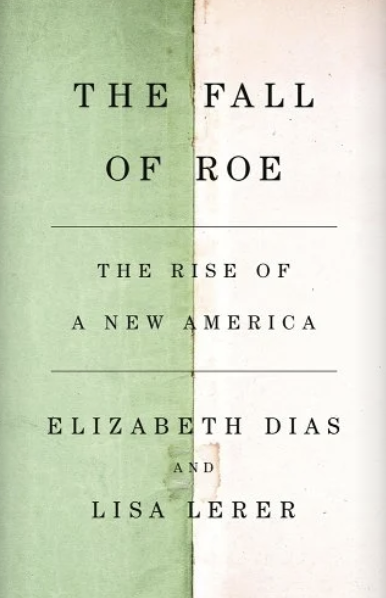
Elizabeth Dias and Lisa Lerer, The Fall of Roe: The Rise of a New America, 2024
Elizabeth Dias and Lisa Lerer, two top New York Times journalists, set out to understand how, after 50 years, Roe fell. They “thought [they] knew the answer,” since they “have reported on abortion in American politics and religion for most of [their] careers.” But “the political tale [they] uncovered is explosive.” “The battle over abortion is not just about whether a woman can end a pregnancy. It is about what it means to be a woman in America at all.” What they found is far more existential, far more complex, than the obvious fact of Trump’s three new Supreme Court appointees. “As Dias and Lerer write, the fight against legal abortion is tied inextricably to the fight for America’s soul” (New York Magazine).
“The Fall of Roe unfolds like a horror story. Danger lurked outside the cabin door, but the threat was never fully perceived by those who lived within” (New York Magazine). Dias and Lerer portray the Liberal establishment that, instead of continuing the fight, rested on their laurels, hubristically assuming that Roe would never really fall. Abortion rights are again on the ballot – as Nicole Wallace said on MSNBC, this is “the most important book in the lead up to this election.” The Fall of Roe was a National Bestseller.
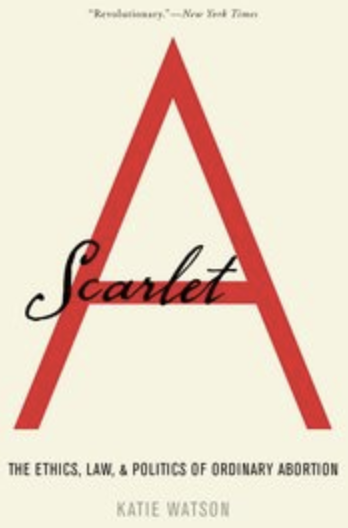
Katie Watson, Scarlet A: The Ethics, Law, and Politics of Ordinary Abortion, 2018
Katie Watson, medical professor, bioethicist and lawyer, begins her book, Scarlet A, unexpectedly—with a trip to Rome. Where, on a Medieval hospital wall, she noticed a strange mechanism. It was a ‘Foundling Wheel’ built in the year 1200 where parents could anonymously leave an unwanted baby—turning the wheel delivered the baby safely into the hospital, where the baby would then be raised by strangers. This experience begins Watson’s line of inquiry in Scarlet A—this universal age-old question of an unwanted pregnancy, and the enduring complexity of the private decision of what to do about it.
But the conversation around abortion is so politicized, it’s a difficult topic to broach. Watson believes that “abortion was correctly identified as a constitutionally protected right and it must remain legal,” but that “we should be able to acknowledge the complexity of private decision making without threatening the right of private decision making.” What results is “an unusual hybrid of a book: part memoir, part legal exegesis, part philosophical tract, part conversational guide” (The New York Times). Watson identifies that the abortions “we discuss most are the ones that occur least” since on each side of the aisle advocates emphasize the extremes. “There’s something unreal about the American abortion conversation,” Watson writes. Scarlet A is her attempt to examine the ordinary reality.
Winner of the NCTE George Orwell Award for Distinguished Contribution to Honesty and Clarity in Public Language
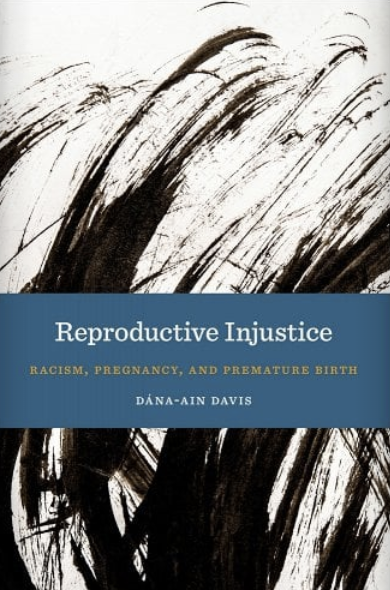
Dána-Ain Davis, Reproductive Injustice: Racism, Pregnancy, and Premature Birth, 2019
Dána-Ain Davis “builds on nearly 30 years of reproductive justice activism and social scientific scholarship to examine how racism informs Black women’s experiences of pregnancy and premature birth” (Oxford University Press). Most research on premature birth has involved poor and low-income women, but Reproductive Injustice “focuses on the experiences of more affluent women to show that race is as much a common denominator as class in adverse birth outcomes” (Oxford Academic).
The book connects the history and current reality of medical racism to an afterlife of slavery, and in illuminating the ways in which that racism persists, seeks to garner change in medicine. Dána-Ain Davis is the Director of the Center for the Study of Women and Society at the Graduate Center, CUNY and Professor of Urban Studies and Anthropology. Reproductive Injustice was listed in New York Magazine as one of seven books on anti-racism.
Eileen Basker Prize in Medical Anthropology, 2020 • Association for Feminist Anthropology’s 2020 Senior Book Prize • Honorable Mention for the Victor Turner Prize in Ethnographic Writing • Finalist for the AAP’s 2020 PROSE Award
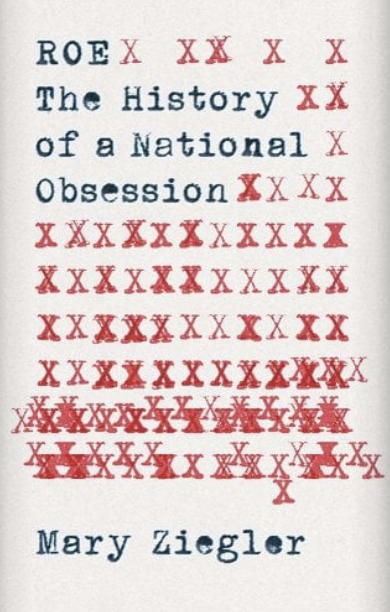
Mary Ziegler, Roe: The History of a National Obsession, 2023
Mary Ziegler is an expert on abortion law. Roe: The History of a National Obsession is her sixth book in a corpus of extensively researched, and analyzed books on reproductive rights in America. This latest book, Roe, “can be understood as a history of the abortion as an argument, and how that argument has influenced American politics over the past half-century,” tracking the rhetoric employed on both sides, from the late 60s, to Roe v. Wade in 1973, when the issue was not yet polarized along partisan lines, all the way to Dobbs v. Jackson Women’s Health in 2022, which overturned Roe (The Nation). “Ziegler’s greatest contribution to the legal history of abortion (besides her prodigious research and her ability to uncover information that no one else has discovered) is her even-handed analysis and attention to nuance and complexity” (Daniel K. Williams, author of Defenders of the Unborn: The Pro-Life Movement Before Roe v. Wade).
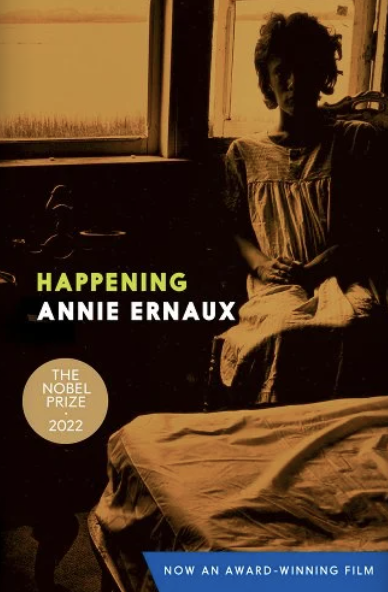
Annie Ernaux, Happening, 2001
Annie Ernaux won the Nobel Prize in Literature in 2022; her body of work speaks “specifically to women and to others, who like her, come from a working class seldom depicted with such clarity” (New York Times). Happening is no different, “recount[ing] what it was like to be a young woman whose life changed—and world ominously narrowed—in 1963 with an unwanted pregnancy… It feels urgently of the moment” (NYT). In 1963, Ernaux is 23. She “hope[s] to see a stain appear,” as she waits for her period to come. When it doesn’t, she writes in her diary, “I am pregnant. It’s a nightmare.” Desperately, she seeks an illegal abortion and the experience almost kills her. “There were the other girls, with their empty bellies, and there was me.”
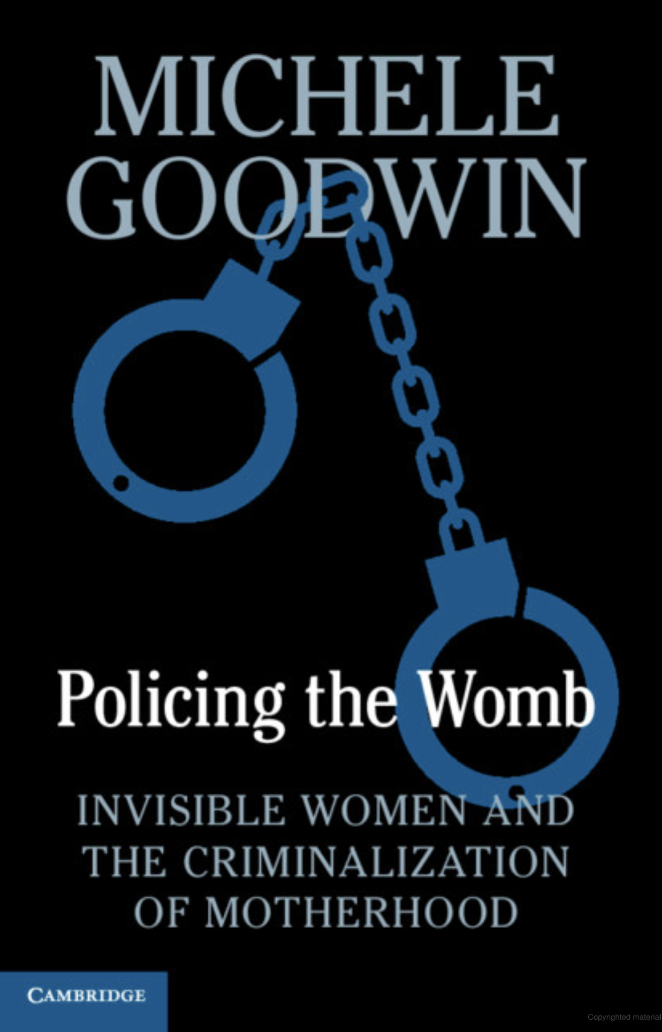
Michele Goodwin, Policing the Womb: Invisible Women and the Criminalization of Motherhood, 2020
“Not only is the United States the deadliest country in the developed world for pregnant women, but the severe lack of protections for reproductive rights and motherhood is compounding racial and indigent disparities” (Lit Hub). Michele Goodwin, American legal scholar and professor whose expertise is in the fields of bioethics and health law, draws on extensive research and advocacy in Policing the Womb. The book “vividly shows how the intensifying punishment of pregnant women in the name of fetal protection comes at a devastating cost to human health and freedom” (Dorothy Roberts, author of Killing the Black Body: Race, Reproduction, and the Meaning of Liberty). Policing the Womb “contains the best explanation I’ve read for the necessity of reproductive justice, not just reproductive rights” (The Washington Post).
Outstanding Academic Titles for 2021, Choice Reviews
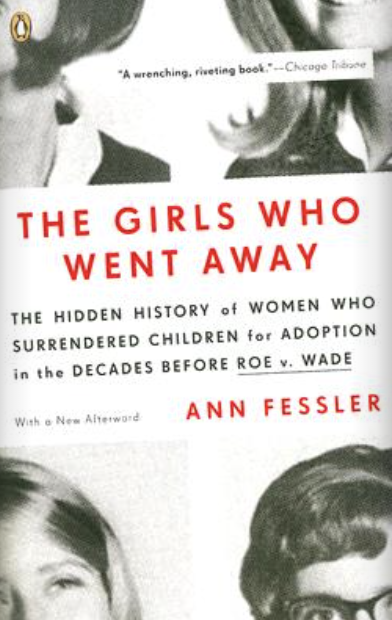
Ann Fessler, The Girls Who Went Away: The Hidden History of Women Who Surrendered Children for Adoption in the Decades Before Roe v. Wade, 2006
In the two decades leading up to Roe v. Wade in 1973, it is estimated that 1.5 million unwed mothers were shamed and hidden away in maternity homes, forced to have their babies, then coerced into giving them up for adoption (The Washington Post). Ann Fessler, a documentary filmmaker, installation artist, and professor of photography at RISD, collected over 100 oral histories from these women. Fessler was herself adopted in the 50s, she was one of the babies “surrendered.” The Girls Who Went Away “is a remarkably well-researched and accomplished book” (The New York Times). “It would take a heart of stone not to be moved by the oral histories of these women and by the courage and candor with which they express themselves” (The Washington Post).
Finalist for the National Book Critics Circle Award in 2006 • Winner of Women’s Way Ballard Book Prize in 2008
